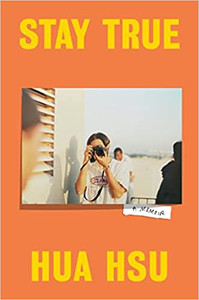stay true by hua hsu | book review
- Gracyn Lian
- May 4
- 5 min read
Updated: May 5
Stay True by Hua Hsu
Published on September 27, 2022 by Doubleday
Genres: Memoir
Pages: 208
Format: Audiobook
Add to Goodreads
Buy on Amazon
★★★★★
In the eyes of eighteen-year-old Hua Hsu, the problem with Ken—with his passion for Dave Matthews, Abercrombie & Fitch, and his fraternity—is that he is exactly like everyone else. Ken, whose Japanese American family has been in the United States for generations, is mainstream; for Hua, the son of Taiwanese immigrants, who makes ’zines and haunts Bay Area record shops, Ken represents all that he defines himself in opposition to. The only thing Hua and Ken have in common is that, however they engage with it, American culture doesn’t seem to have a place for either of them.
But despite his first impressions, Hua and Ken become friends, a friendship built on late-night conversations over cigarettes, long drives along the California coast, and the successes and humiliations of everyday college life. And then violently, senselessly, Ken is gone, killed in a carjacking, not even three years after the day they first meet.
Determined to hold on to all that was left of one of his closest friends—his memories—Hua turned to writing. Stay True is the book he’s been working on ever since. A coming-of-age story that details both the ordinary and extraordinary, Stay True is a bracing memoir about growing up, and about moving through the world in search of meaning and belonging.
Screaming. Crying. Throwing up. This book is one that I know will stick with me for a long while after finishing it.
Hua and Ken are as opposite as two people can be, despite both being Asian Americans who struggle in a white society. Ken is a frat bro who always walks with confidence, who dates and hooks up with girls, who doesn't take life too seriously (at least, on the surface). On the other hand, Hua feels like a wanderer, finding solace in indie bands that no one else gets or understands the way he does and the creation of his zines. Despite their differences, they become best friends, sharing late-night conversations, deep talks about the world and what the meaning of life is. Even if they don't know what the future holds, at least they have each other and their friendship can act as a float amidst waves of uncertainty.
That is, until Ken is murdered, and the entire friend group must cope with his death and what it all means about life--Hua most of all.
“Some friends complete us, while others complicate us. Maybe you feel as if there were nothing better in the world than driving in a car, listening to music with friends, looking for an all-night donut shop. Nobody says a thing, and it is perfect. Maybe your lifelong fascination with harmony finally began to make sense in those scenes, packed in your family's station wagon, singing along to "God Only Knows," waiting in the parking lot until the song was over.”
Hsu's writing style was captivating from the start as he detailed his childhood and the way he never quite fit in, as he talked about his parents immigrating to the United States and the challenges that come with integrating into a new culture. He talks about photographs of him and Ken and their other friends, analyzing the expressions on people's faces frozen in time, explaining the story behind the photos with a nostalgic wispiness. He regails wild summers that seem as if they come straight from a coming-of-age story of young adults finding themselves in the world. They act as if no one understands them, and perhaps no one does.
I found myself lost in the prose, the words morphing into grainy images of the scenery Hsu set, or old CD cases of the music and the bands he mentioned. There were times where I forgot I was merely reading and not just watching a movie in my mind. I was grateful that the audiobook was narrated by Hsu himself because I was able to read his words and hear them just the way he intended. I was carried away to California, to the backseat of the car shared between Hua and his friends, to the record store that played Nirvana's "Smells Like Teen Spirit," the song that introduced Hua to the indie lifestyle.
It feels wrong to judge the story, knowing that it is not quite one with a happy ending and that these characters and situations were real. What I can say is that Hsu weaved the strings of his own upbringing and that of his parents cleverly with his relationship with Ken until, by the end of the book, the reader was left with a brilliant tapestry of memories, two lives forever interwoven together.
The reader can see as Hsu grew from the events, from Ken's death. He grieved, and while death is not something to easily move on from, Hsu was able to accept that he was not to blame for his friend's death. We watch as Hsu metamorphoses from adolescent to adult, teaching at-risk youth, advocating for minority rights, finding himself within the context of romantic relationships.
“The allure all these years had been the possibility of the asymptote’s line one day meeting the curve. At first this realization that I could never force a connection seemed tragic; then it became comforting to imagine that the line and the curve could go on forever.”
Even though I knew that Ken died, I was not prepared for it. It felt as if my heart had been ripped out into a million pieces because, despite knowing the ending of this story, there was some small storage of hope in one of my heart's chambers. I was rooting for Ken and Hua's friendship because Hsu wrote with an intimate and sincere voice that displayed another aspect of male friendships that isn't often portrayed by the media. He showed glimpses of vulnerability that made Ken's death all the more devastating.
Throughout this book, there are strong themes of immigration and assimilation, specifically among America's Asian population, themes of relationships and change, of self-discovery and of minority rights and discrimination. But most of all, the biggest them plays homage to the book's title, and that is to stay true to yourself. Whether you're like Ken and are influenced by mainstream trends, or you're like Hua and will do anything to not be influenced by mainstream trends, the biggest service you can do for yourself is to stay true to who you are and to love your friends.
“The intimacy of friendship, he wrote, lies in the sensation of recognizing oneself in the eyes of another. We continue to know our friend, even after they are no longer present to look back at us. From that very first encounter, we are always preparing for the eventuality that we might outlive them, or they us. We are already imagining how we may someday remember them.”








Comments